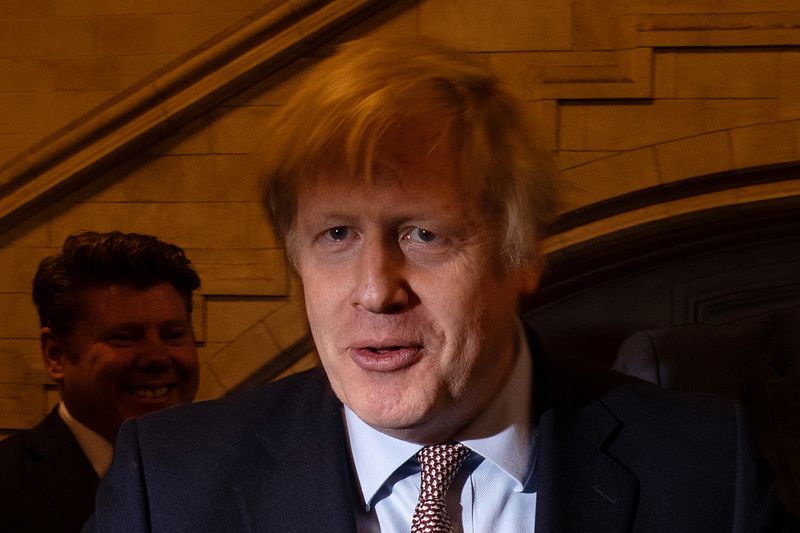By Guy Faulconbridge
LONDON (Reuters) - British Prime Minister Boris Johnson will use the prospect of a Brexit cliff-edge at the end of 2020 to demand the European Union gives him a comprehensive free trade deal in less than 11 months.
In his boldest move since winning a large majority in last Thursday's election, Johnson will use his control of parliament to outlaw any extension of the Brexit transition period beyond 2020.
"Our manifesto made clear that we will not extend the implementation (transition) period and the new Withdrawal Agreement Bill will legally prohibit government agreeing to any extension," a senior government official said on Tuesday.
Asked if the government would legislate to rule out any extension of the transition beyond 2020, one of Johnson's most senior ministers, Michael Gove, said: "Exactly, absolutely."
After the United Kingdom leaves the European Union on Jan. 31, it enters a transition period in which it remains an EU member in all but name while both sides try to hammer out a deal on their post-Brexit relationship.
A comprehensive free trade deal would encompass everything from financial services and rules of origin to tariffs, state aid rules and fishing, though the scope and sequencing of any future deal is still up for discussion.
The pound fell 1.2% to $1.3155 and to 84.59 pence against the euro, levels where it had traded before the scale of Johnson's victory became clear on Thursday evening and prompted strong gains. The pound is down more than 2% from a post-election high above $1.35 against the dollar.
By enshrining in law his campaign promise not to extend the transition period beyond the end of 2020, Johnson cuts the amount of time he has to negotiate a trade deal to 10-11 months - and possibly quite a lot less, given the time needed for UK and EU parliamentary approval of any deal.
The EU hopes to start the trade talks with Britain by March.
Trade deals usually take many years. The 2,000-page EU-Canada trade deal known as CETA, or the Comprehensive Economic and Trade Agreement, took seven years to negotiate.
While Johnson's large majority gives him the flexibility to change the law should he need to, he is sending a message to the EU - whose leaders have cautioned London that more time would be needed for a comprehensive trade deal.
EU DEAL?
If the United Kingdom and the EU failed to strike a deal on their future relationship and the transition period were not extended, then trade between the two would be on World Trade Organization (WTO) terms - more burdensome for businesses.
The EU insists it will not seal a trade deal with a large, economically powerful neighbor without solid provisions to guarantee fair competition.
Its demands will focus on environmental and labor standards, as well as state aid rules to ensure Britain would not be able to offer products on the bloc’s single market at unfairly low prices.
Britain’s conundrum is that it will be under pressure to loosen rules on agricultural and food standards to strike a bilateral trade deal with the United States.
But this would be crossing a red line for the EU, which would restrict access to its market to protect its own producers.
Johnson and U.S. President Donald Trump by phone on Monday and they agreed on the need for continued close cooperation and the negotiation of an "ambitious" UK-U.S. free trade agreement.
In Britain's talks with Brussels, fishing will be a particularly thorny issue as EU countries will no longer be able to operate in British waters as they do now.
With industry supply chains in the EU crossing borders multiple times for products like cars and drugs, agreeing exact rules to designate where products come from - and hence what regulations and taxes apply - will also be fraught.

"It will be very complicated. It’s about an array of relations, in trade, in fishing and cooperation in security and foreign policy," German Chancellor Angela Merkel told an EU summit news conference on Friday.
(Writting by Guy Faulconbridge in London; Additional reporting by Michael Holden in London, Gabriela Baczynska and John Chalmers in Brussels and Akshay Balan in Bengaluru; Editing by Janet Lawrence and Gareth Jones)